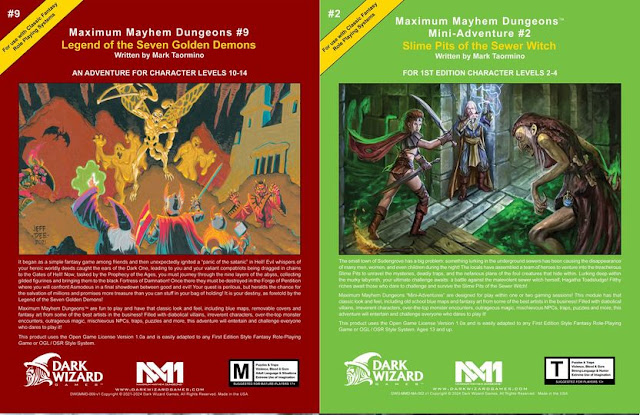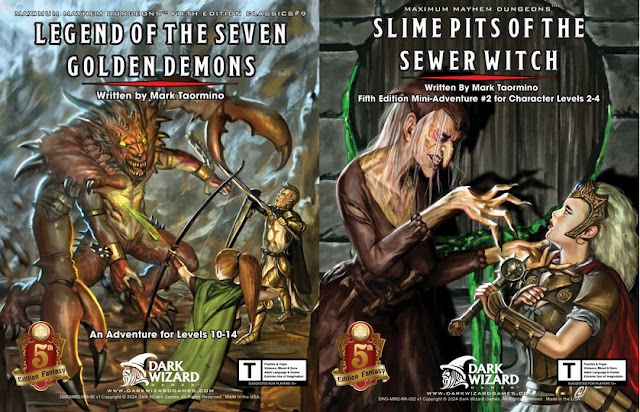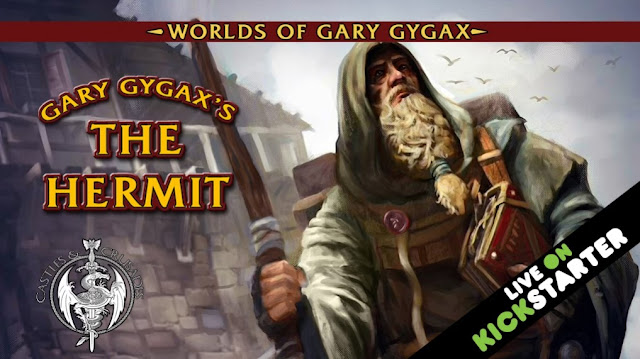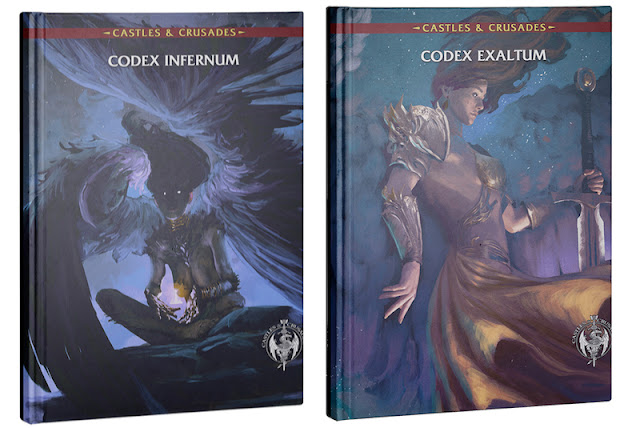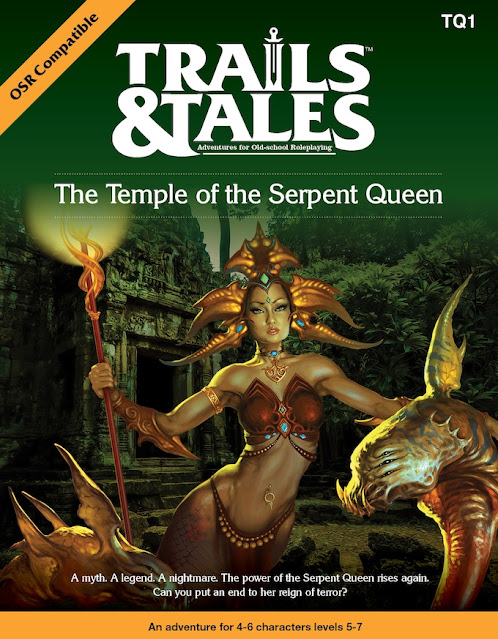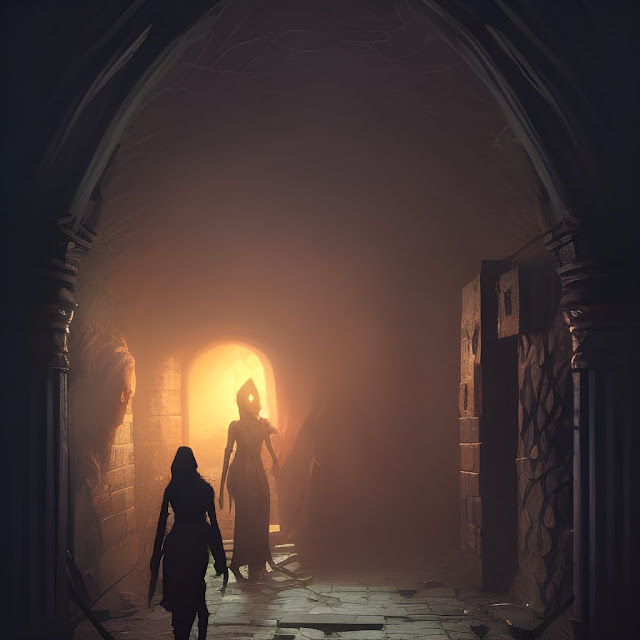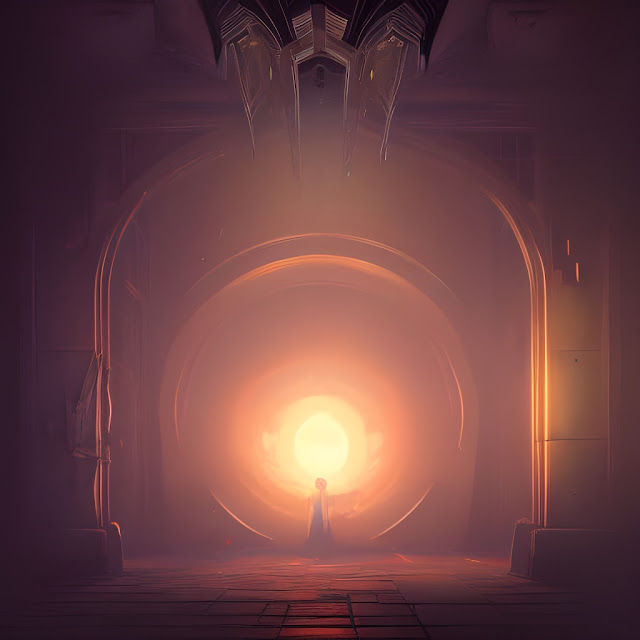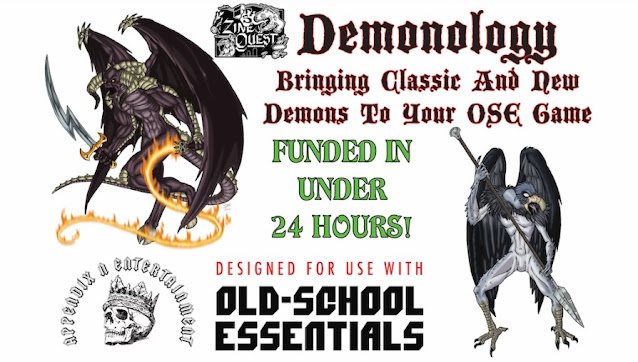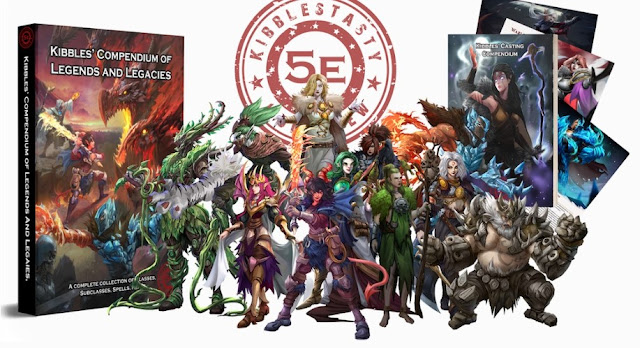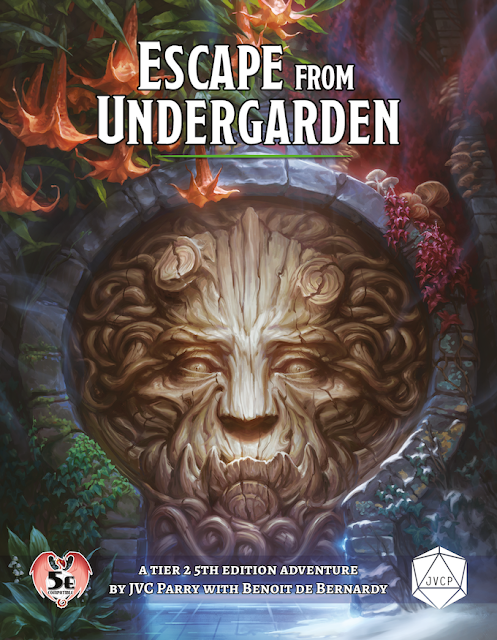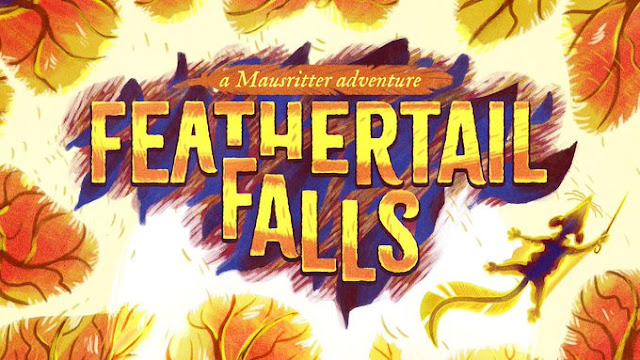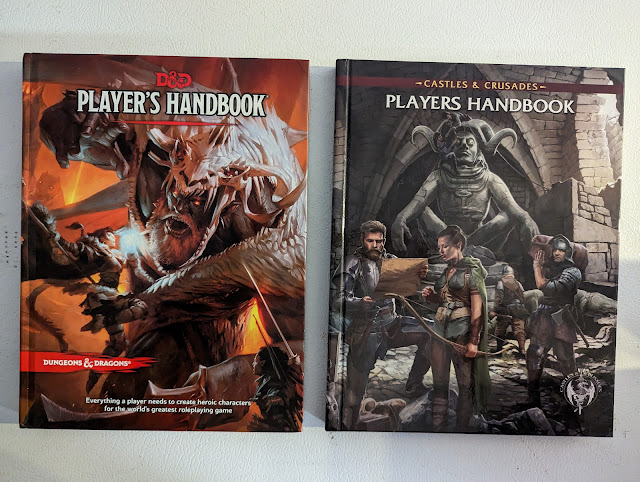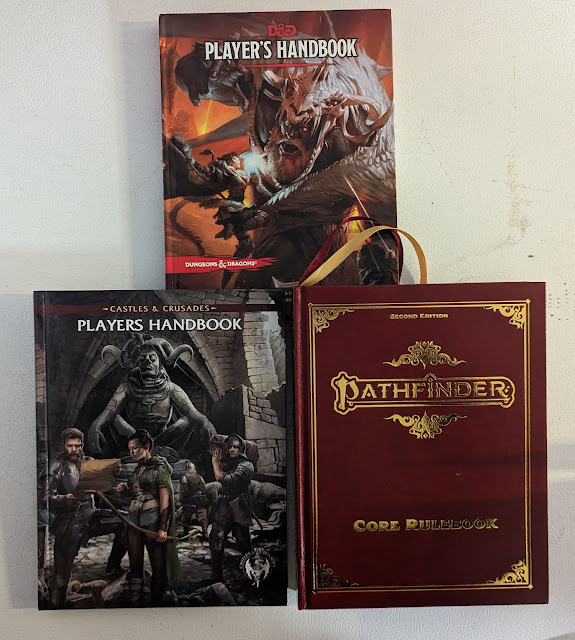I started this post once before, but I am returning to it now. Especially now with so much new Castle Greyhawk material to be had. I also wanted to do another of my In Search Of... feature.
In Search Of... Castle Greyhawk
Castle Greyhawk has been a quasi-mythical dungeon. It did exist, in one form or another, and was part of Gary Gygax's own D&D campaign. It was rumored to be anywhere between 13 levels, to 70 to 100s of levels. It was merged with Rob Kuntz's "El Raja Key" at some point and made even larger. The full Castle Greyhawk had always been promised to us but only partially delivered. I'll have some links below so you can read more on all of these topics.
The Published Castles Greyhawk
Despite never getting a full and proper publication, many Castles Greyhawk have existed over the years. Some official, others...well, less so, but all fit the spirit of the idea of Castle Greyhawk. I will cover them below with my own experiences.
WG7 Castle GreyhawkI remember being quite excited about this one. The *real* Castle Greyhawk. Finally! Well...that is not the case, really. I like humor in my games, but this was not a great adventure nor a particularly good "joke" one. There are some good bits here. I loved the idea of multiple levels. I loved the idea of a different author/designer taking on each one. Some of the levels were also fun send-ups of my early D&D tropes like "The Temple of Really Bad Dead Things." Sadly, it all never really worked.
Getting different designers to cover each level was fun in theory. They never connected at all. Some were even so bad that I had my players bypass them altogether. For example, when they got to Level 8, I put a "handwritten" sign (in ketchup, no less) up outside the entryway saying, "Food fight in progress, please proceed to Level 9." Eventually, the whole thing collapsed under the weight of its own silliness.
There are some good ideas here. There are some good hooks, and I like the introduction and the first level. Though I do remember some awkwardness in the transitions between levels. One I recall was Level 10, which assumed that you had gone all the way back up to Level 1. Seemed to run counter to the stated reality of the adventure. The maps are good, the art, for the most part, is fun, and again, pulling it all apart to make a bunch of unrelated mini-adventures might be the way to go.
However, I can't help but think that there was a little bit of vindictiveness in having such a high-profile and "bad" adventure carry the name Castle Greyhawk come out in the days after Gary Gygax had been let go. Given that the previous WG7 was supposed to have been a high-level adventure from Gygax called Shadowlands. There is a lot of evidence against this, but thinking back to 1988 and knowing that Gary had been booted. Plus, at the time, I was connecting with other gamers from all over the state, and we shared our pre-Internet opinions. Well, conclusions, truthful or erroneous, can be drawn, and opinions die hard.
Don't misunderstand me; I know Gary loved a good funhouse dungeon. And really, is this one any more ridiculous than "Tomb of Horrors" or the really awful puns in the graveyard of Castle Ravenloft? This one, however, feels like a bridge too far. It was too bad, really. I was in the midst of my "Greyhawk renaissance" at the time, and I wanted to consume anything and everything related to Greyhawk, but mostly official Greyhawk material, rather than the pastiche I had built over the years.
I had a copy, but I lost it many years ago, and I recently reacquired my copy from my old DM's collection. I have the PDF, but I never had a desire to grab a new PoD version. However, I did think about it back in my early days working with Eden Studios, when I read the WitchCraft short story "The House that Dripped Clichés." I wanted to make something good of the Castle Greyhawk adventure. But ultimately, I reasoned I would be better off making my own. Thankfully, I didn't have to.
After the misfire of WG7 Castle Greyhawk, TSR had another go at presenting the legendary dungeon in print. This time, in 1990, they gave us WGR1 Greyhawk Ruins, written by Blake Mobley and Timothy Brown, for 2nd Edition AD&D.
On the surface, this one looked like a course correction. Gone was the parody tone, gone were the ketchup-smeared signs, and in their place was a serious attempt to frame Castle Greyhawk as an honest-to-goodness megadungeon. The adventure describes the ruins of the Castle aboveground, and beneath them, three partially intact towers that served as gateways to the deeper dungeon levels.
This felt much closer to what I had always imagined Castle Greyhawk to be. The presentation was straightforward: keyed maps, monsters, treasure, and plenty of challenges. In many ways, it’s a classic meat-and-potatoes dungeon crawl, and for DMs who wanted a usable Greyhawk megadungeon without wading through parody, it delivered.
But there were two problems. First, no published module could ever live up to the myth of Castle Greyhawk by this point. Gamers had been hearing about Gary’s original for over fifteen years, and expectations had grown to impossible heights. Second, the stink of WG7 still lingered. After being burned once, many fans weren’t ready to embrace a new “official” Castle so soon. That left Greyhawk Ruins in a tough spot: serious in tone, expansive in scope, but struggling to shake off its predecessor’s shadow.
I also have to admit, I’ve never been a fan of the cover. It doesn’t capture the sense of awe and menace I wanted from the ruins of the game's greatest dungeon. Inside, though, the content is solid. Twenty-five plus levels of dungeon to explore, each with its own flavor, from ruined laboratories to caverns crawling with monsters. It’s not subtle, but it is dangerous, and it can easily keep a party busy for years of game time.
Looking back, WGR1 Greyhawk Ruins represents the first truly earnest attempt to give us Castle Greyhawk as an actual megadungeon. It wasn’t Gary’s Castle, and it wasn’t Rob’s either, but it was playable, and it kept Greyhawk alive at the table in the early 2e era. For me, it feels like the first step toward reclaiming the myth after WG7, even if it never stood a chance of satisfying everyone’s expectations.
This is another old adventure of mine that was in the collection of my old DM. I think I bought it with the idea that he would run me through it, but it was the 1990s, and I was still finishing up my undergrad studies and likely never got around to it.
Expedition to the Ruins of Castle Greyhawk
By the time 2007 rolled around, I had already been through the highs and lows of Castle Greyhawk in print. WG7 had left a sour taste, WGR1 had done some course correction, but the mythical real Castle Greyhawk still seemed just out of reach. Then came Expedition to the Ruins of Castle Greyhawk for D&D 3.5. On paper, this was the one that might finally get it right.
This was a big (224 pages), glossy hardcover and part of Wizards’ “Expedition” series that included Expedition to Castle Ravenloft, Expedition to the Demonweb Pits, and Expedition to Undermountain. These books were meant to be love letters to classic adventures, rebuilt for the then-current edition. And with writers like Jason Bulmahn, James Jacobs, and Erik Mona (names I respected then and now), I had reason to hope.
The book immediately set itself apart from WG7’s funhouse antics. Instead of a parody, it gave us a full-on campaign, a sprawling dungeon crawl combined with political intrigue in the Free City of Greyhawk. Iuz, Zagyg, my ex-girlfriend Iggwilv, and even Zuoken show up, giving the adventure cosmic stakes beyond just “loot the dungeon.” It’s pitched for characters of about 8th–13th level, which honestly felt right. By that point, adventurers are strong enough to tangle with demigods, but not so epic that the whole thing feels like a superhero comic.
The design is ambitious. You don’t just get dungeon rooms mapped and keyed; you get partial maps, encounter tables, and plenty of blank space to make the Castle your own. That’s clever; it echoes the fact that Gary’s original Castle Greyhawk was never static. It was a living, changing environment, tailored to the players at the table. Of course, the downside is obvious: if you're looking for a completely mapped, plug-and-play megadungeon, you won’t find it here. DMs had to be ready to improvise and prep.
I ran pieces of it rather than the whole campaign. Some of the encounters, especially with the new monsters (the aurumvorax got a facelift here, and the cataboligne demon was nasty), were deadly even for 13th-level PCs. My players loved that sense of danger, though — it felt like the dungeon had teeth again.
But did it finally give us the “real” Castle Greyhawk? Well. That depends on what you were hoping for. If you wanted Gary’s original notes, this wasn’t it. If you wanted a megadungeon that was both a campaign centerpiece and a love letter to Greyhawk lore, it largely delivered. It felt like Mona and Jacobs, in particular, were saying, “Yes, Greyhawk matters. Here’s why.”
I remember closing the book after my first read-through and thinking: this is probably as close as we’re ever going to get to a “canon” Castle Greyhawk. Not Gary’s, not Rob’s, but a 3rd Edition interpretation that pulled from the mythos, built a strong framework, and left room for each DM to add their own touch. Say what you like about 3rd Edition, but at the time, respect for Gary was at an all-time high.
Thankfully, it was not the last word.
If Expedition to the Ruins of Castle Greyhawk was Wizards of the Coast’s official attempt to canonize the Castle for 3rd Edition, then Castle of the Mad Archmage was the fan-driven answer — and in many ways, it feels closer to the dream of a “true” Castle Greyhawk than anything TSR or WotC ever put out.
Joseph Bloch, the “Greyhawk Grognard,” originally released Castle of the Mad Archmage starting in 2009. His idea was simple: if Wizards of the Coast wouldn't and TSR couldn't (because they were gone) give us the real Castle, then he would build one in the old school spirit, level by level, and let people play in it. Later, he expanded and polished the whole into a professional print version through his company, BRW Games. You honestly have to admire that.
This is a megadungeon in the classic sense, sprawling, multi-layered, with dozens of levels stacked on top of each other. Unlike WGR1 or Expedition, Bloch’s Castle doesn’t pull back. It goes all in. If you want a dungeon that feels like it could go on forever, with weird sub-levels, eccentric monsters, and dangerous tricks, this is it. The DNA is clearly Gygaxian: funhouse elements mixed with deadliness, nods to pulp fantasy, and the sense that anything could be around the next corner.
When I first cracked it open, I remember thinking: “This is what I wanted WG7 to be.” It’s not parody. It’s not restrained to three towers. It’s not half-mapped. It’s a full megadungeon you could run a whole campaign in, or strip for parts if that’s more your style. And it’s very much meant for old-school play, resource management, exploration, and danger at every turn.
Is it Gary’s Castle Greyhawk? No, of course not. But in spirit, it comes closer than most. Bloch captures that sense of scale and unpredictability that the Castle always promised. For me, this book represents what the fan community can do when official channels fall short: keep the torch burning, keep the dungeons sprawling, and keep Greyhawk alive at the table.
Now I am a bigger fan of "Expedition to the Ruins of Greyhawk" than Joseph is. But I am happy to have both in my collection.
There are several "flavors" to choose from to suit your gaming needs.
- Castle of the Mad Archmage (5E Edition) Digital + Print Bundle
- Castle of the Mad Archmage (Pathfinder Edition) Digital
- MA1 Castle of the Mad Archmage - The Core Levels
There will likely be more.
Castles & Crusades Castle Zagyg YggsburghWhen Gary Gygax himself returned to publishing in the early 2000s, hope flared again that we might finally see his Castle Greyhawk the original megadungeon that started it all. Of course, Wizards of the Coast owned the Greyhawk name, so Gary couldn’t publish it directly. Instead, he partnered with Troll Lord Games and released it under the title Castle Zagyg (Zagyg being Gary’s famous mad archmage, his own anagram).
The first product in this line was Castle Zagyg: Yggsburgh in 2005. Rather than plunge straight into dungeon levels, this hefty book detailed the city of Yggsburgh, Gary’s version of the Free City of Greyhawk. It was written for Castles & Crusades, Troll Lord’s ruleset that deliberately hewed close to the feel of old-school AD&D, but conversion to earlier editions was painless.
Yggsburgh wasn’t the dungeon itself, but it was meant to set the stage: a living, breathing city that adventurers could use as their home base before venturing into the nearby Castle. The book offered districts, NPCs, and hooks galore. For those of us who had been following the “Castle Greyhawk saga” for decades, it was tantalizing. At last, we had something directly from Gary’s hand.
The plan was to follow this up with the dungeon levels themselves, released as boxed sets under the Castle Zagyg name. A few pieces trickled out, Castle Zagyg: The East Mark Gazetteer and The Upper Works (2008), before Gary’s death in March 2008. After that, the line was discontinued. For various reasons that I don't really need to get into now the line would remain dead for the next 15 years.
In 2023, Troll Lord Games released a 256-page Classic Reprint of Yggsburgh through DriveThruRPG and their own website, making this long out-of-print title available again to fans who missed it the first time. It’s a facsimile edition, preserving the original text and layout; a chance to finally own one of the last projects Gary worked on. Not only that, the maps are by none other than Darlene herself.
So, what we got in Yggsburgh was a glimpse of what could have been: Gary’s vision of the city that would sit at the foot of his legendary Castle. The megadungeon itself never fully saw print. That fact alone makes this one bittersweet. Reading through Yggsburgh now, you can see the connective tissue to Greyhawk, but also Gary striking out on his own terms, freed from TSR and later WotC.
For me, Castle Zagyg: Yggsburgh is less about the content (though it’s rich with Gary’s flavor and quirks) and more about the promise it represented. We almost had the real thing. We almost got to walk the halls of the original Castle with Gary as our guide. Instead, we’re left with fragments.
And the myth grows ever larger.
How to Reconcile All These Castles Greyhawk?
Regardless of what version of Castle Greyhawk you prefer, someone else has a different opinion. How can we have ALL the Castles Greyhawk in a game?
Well. We borrow from the real world.
Zagig Yragerne as Ludwig II of Bavaria
Known as "The Mad Archmage," Zagig Yragerne was the builder of Castle Greyhawk. But what if the Mad Archmage had something in common with another famously "Mad" person? In particular King Ludwig II of Bavaria, also known as "The Mad King." Why was he mad? He built castles. Lavish ones at that. Neuschwanstein Castle, Linderhof Palace, and Herrenchiemsee. Neuschwanstein is a "fairy tale" castle and is the model for the castles of Disney World and Disneyland. There is even a tenuous connection to Castle Falkenstien here that I might explore later on.
So what if all the Castle Greyhawks are real? All were built by Zagig Yragerne, and all of them were called at one point or another "Castle Greyhawk?"
Which leads me to my next thought.
Castle Greyhawk as a Pan-Dimensional Altgeld Hall
On five Illinois college campuses, castles were built during the time of Gov. John Altgeld. These buildings are all called Altgeld Hall, and all resemble Gothic Revival Castles. There has been a long-standing rumor that you could take these buildings and put them together to form one massive castle. There is no evidence of this, but it was a powerful idea. Plus, having walked by Altgeld Hall at SIUC for years, it left a powerful image. One too good to ignore.
What if all of the various Castles Greyhawk are connected somehow? Not like I suggested with the Temple of Elemental Evil (one location that exists simultaneously across multiple realities), but one supermassive structure built in different pieces in different locations.
What was Zagig trying to accomplish? Was he going to build these different castles and link them? Merge them across time and space? This may explain why WGR1 Greyhawk Ruins and Expedition to the Ruins of Castle Greyhawk have similar maps in some places but very different ones in others.
Maybe I could tie this into my whole idea of Erde/Oerth/Arth/Urt/Learth/Ærth, where there is a Castle Greyhawk on the various connecting planes, and they are the point of contact. From the Castle's perspective, it is one massive structure; it's just that mortals only see what is on their own plane. Now, are the castles there because the planes are connected? OR are the planes connected because the Castles are there?
There is at least some published evidence to this. Erde/Aihrde, the world of Castles & Crusades, has its own Castle Yggsburgh, AND for a time, they were the publisher of Lejendary Adventures. So maybe Erde/Aihrde is what I jokingly refer to as Learth.
Frank Mentzer gave us Urt, an earlier name for Mystara which is Earth circa 150 MYA. And we know that he was working on the other side of Oerth; Aquaria. It is not a stretch then that there is a Castle Greyhawk on Mystara/Urt too. Those with the knowledge can move from to the next and thus cross realities. NOTE: I am not going to explain why Empyrea failed here. There are more sites on the net that have gone over that far more in-depth than I will or even want too.
By this logic, there could be more Castles Greyhawk out there in the D&D multiverse just waiting to be discovered.
In Search Of the Real Castle Greyhawk
At the end of this long journey through the printed Castles Greyhawk, I keep coming back to the same realization: there was never just one Castle Greyhawk. Every attempt to capture it on paper; from the parody of WG7, to the earnest sprawl of WGR1 Greyhawk Ruins, to the ambitious but incomplete Expedition to the Ruins of Castle Greyhawk, to Joseph Bloch’s Castle of the Mad Archmage, and finally Gary’s own Castle Zagyg: Yggsburgh; all circle the same mythic source but never quite touch it.
Part of that is simple: Gary’s Castle was never a finished product. It was a living dungeon, reshaped by play, rebuilt after disasters, improvised week after week for the players in his original group. You can’t publish that experience whole cloth. At best, you can give glimpses, fragments, or homages. It will never be the late 1970s in Lake Geneva, WI ever again.
But maybe that’s the true legacy of Castle Greyhawk. Not the maps, or the monsters, or the towers above the Free City, but the idea that the dungeon is never done. It’s always changing, always waiting for the next group of adventurers to descend into its depths. Every version we’ve looked at, official or unofficial, serious or silly, carries a spark of that truth.
Gary himself got closest with Castle Zagyg, and though his death left that project unfinished, what we did get reminds us that the Castle was never about completeness. It was about potential. It was about mystery. It was about a group of players gathered around a table, wondering what lay behind the next door.
So, in a sense, the real Castle Greyhawk has always been with us. It’s in every megadungeon we map, every ruin we stock with monsters, every campaign we launch into the unknown. The Castle is a myth, yes, but it’s a myth that keeps inspiring us to build, to imagine, and to play.
And maybe that’s the best tribute of all.
Links
This is not an exhaustive list, it is the one I used when researching this post.
- Castle Greyhawk at the Greyhawk Online Wiki
- Castle Greyhawk at Grognardia
- Castle Greyhawk at Swords & Stitchery
- Castle Greyhawk at Zenopus Archives
- Castle Greyhawk at Greyhawk Musings (I especially enjoyed the stuff on the Circle of Eight)
- Castle Greyhawk at Greyhawkery
- Greyhawk Grognard, who has forgotten more than I know about Castle Greyhawk
- Posts about Castle Greyhawk
- Posts about the Castle of the Mad Archmage
- Castle of the Mad Archmage 10th Anniversary edition
- Wikipedia
- El Raja Key
- Gary’s Immersion in Castle El Raja Key: The Four-Way Footsteps, EN World by Rob Kunzt
- Kunzt Bibliography
- El Raja Key Archive
- El Raja Key Archive and the Mapping Styles of Kuntz & Gygax
- Frank Mentzer notes
- Empyrea and Aquaria, east of Gygax’s World of Greyhawk Setting
- Empyrea at ENWorld
- Empyrea at Dragonsfoot (with the disappointing ending of it all)


























